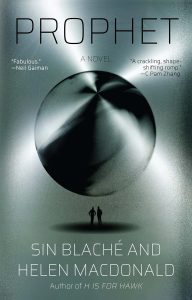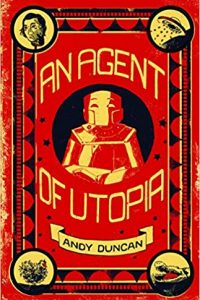Jake Casella Brookins Reviews Prophet by Sin Blaché & Helen Macdonald
 Prophet, Sin Blaché & Helen Macdonald (Grove Press 978-0-8021-6202-1, 480pp, hc) August 2023.
Prophet, Sin Blaché & Helen Macdonald (Grove Press 978-0-8021-6202-1, 480pp, hc) August 2023.
Seeing Helen Macdonald’s name show up on a speculative fiction list immediately fixated my attention. H is for Hawk is, without a doubt, the most mesmerizing combination of memoir, nature writing, and mini-T.H. White biography out there, and so I knew Prophet was not one to skip. Written together with Sin Blaché, the novel is a surprising and unexpected blend of surreal science fiction, action thriller, and slow-burn queer romance, character-driven with a depth I rarely encounter in SFF.
Sunil Rao is a former British operative recruited for his uncanny ability to spot fakes and lies; Adam Rubenstein is his former American handler. They’re brought back together for a bizarre case: the unexplained appearance on a British military base of random objects ranging from plush toys and board games to a full-sized American diner. Each of these objects has a connection, and a potentially deadly attraction, for one particular person; as Rao and Rubenstein investigate, what had seemed to be an isolated incident is revealed as a globe-spanning and world-threatening phenomenon.
‘‘Mysterious object’’ science fiction feels like it’s having a tiny bit of a moment, and it’s interesting to encounter Prophet’s enigmas so soon after B.H. Panhuyzen’s A Tidy Armageddon. Here, though, the objects are less incomprehensible, inhuman, in a Roadside Picnic vein, and more the distressingly psychological relevance of Solaris’s apparitions. It comes out that this epidemic of objects – sometimes, unnervingly, animate – is the result of an experimental substance, code-named ‘‘Prophet,’’ and while the results so far have been eclectically and unfortunately individual, shadowy corporate figures are seeking more targeted manifestations.
While there’s loads of spycraft, military-industrial chicanery, and a healthy dose of action – including a final sequence that veers into some fairly gruesome horror, with characters in the book noting that it’s getting a bit like Carpenter’s The Thing – the beating heart of Prophet is Rao and Rubenstein’s relationship. This is the most dialog-centric novel I’ve read in some time, and the will-they-won’t-they, will-these-opposites-attract dynamic between its two main characters is its driving force. It’s not quite ‘‘only one bed’’ territory, but not far outside. Despite the self-consciously X-Files-ish plot – and it is quite propulsive – what stands out here are Rao and Rubenstein’s conversations, their retreats to a safe hotel room each night to talk through the day.
Something you just have to accept for the novel to work, it must be said, is Rao and Rubenstein’s singular natures. Rao has his unexplained and infallible truth sense, so accurate that he can ‘‘brute-force’’ solutions by essentially playing twenty questions with himself, and his equally unexplained abilities to absorb Prophet. Likewise, we just have to accept that Rubenstein lies somehow outside Rao’s veridical perception, and that he has his own set of utterly unique Prophet-related abilities.
With a cowritten novel, it’s always tempting to try to figure out who wrote what. I can’t guess either way, but what I will say is that the narration here conveys two radically different characters – as well as an assortment of interesting supporting roles – in a really captivating way. Rao is manic, talkative, flamboyant, on the edge of self-destructive, and with a deep well of guilt and reflection around his role in the Afghanistan invasion, while Rubenstein, with an almost psychologically stoic exterior, is slowly fleshed out through childhood flashbacks. They’re a sharply contrasting dyad that works somehow, and they form a believable focal point that the rest of the story easily fits around. Coupled with the surprisingly outlandish heights that Prophet reaches, I found myself quite unexpectedly reminded of another co-written, unusual romance – Amal El-Mohtar and Max Gladstone’s This Is How You Lose the Time War.
Something that Prophet keeps uneasily at arms-length, without ever quite putting down, is a real critique of American militarism and nationalism; Prophet’s ability to harness nostalgia is linked to a project to, not to put too fine a point on it, make America great again. Nostalgia itself – not in the twee sense of wistful memory, but in the original formulation as a psychological disease – is a central point of the duo’s investigation, and the specter of a culture that can only think itself in commercialized objects is never far from the monstrosities they face. Nostalgia as apocalypse – there are some interesting resonances here with Ling Ma’s Severance, and it’s hard to avoid reading this as, at least in part, a blistering criticism of empty materialism. As Rubenstein puts it: ‘‘The end of the world is just people glued to toys.’’
I’ve never read anything with quite this combination of elements, and Blaché and Macdonald balance the mix superbly. This feels fresh – not exactly genre-blending or -breaking, but a very different set of skills and expectations brought to bear on paranormal investigation tropes, and backed by some of the most compelling characters I’ve encountered in ages. Highly recommended.
Jake Casella Brookins is from the Pennsylvania Appalachians, and spent a fantastic amount of time in the woods. He studied biology, before switching over to philosophy & literature, at Mansfield University. He’s been a specialty coffee professional since 2006. He’s worn a lot of coffee hats. He worked in Upstate New York and Ontario for about 8 years. He’s been in Chicago since 2013; prior to the pandemic, he worked for Intelligentsia Coffee in the Loop. Starting in 2021, he’s been selling books at a local indie bookstore. He lives with his wife, Alison, and their dogs Tiptree & Jo, in Logan Square.
This review and more like it in the September 2023 issue of Locus.
 While you are here, please take a moment to support Locus with a one-time or recurring donation. We rely on reader donations to keep the magazine and site going, and would like to keep the site paywall free, but WE NEED YOUR FINANCIAL SUPPORT to continue quality coverage of the science fiction and fantasy field.
While you are here, please take a moment to support Locus with a one-time or recurring donation. We rely on reader donations to keep the magazine and site going, and would like to keep the site paywall free, but WE NEED YOUR FINANCIAL SUPPORT to continue quality coverage of the science fiction and fantasy field.
©Locus Magazine. Copyrighted material may not be republished without permission of LSFF.






